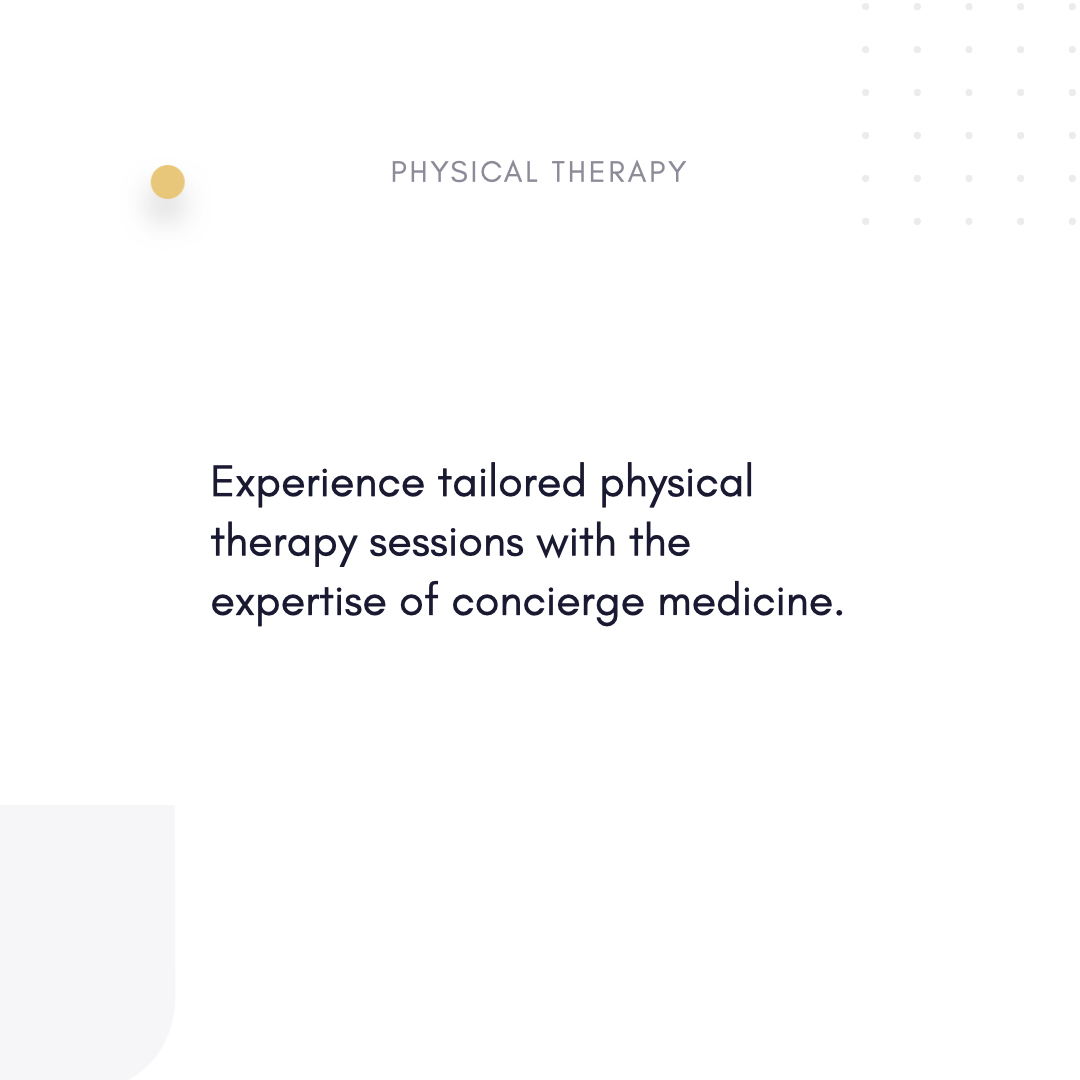



Injuries, chronic pain, mobility, and overall physical function can all be improved with physical therapy. By providing patients with customized treatment plans, specialized care, and convenient access to rehabilitation services, concierge medicine provides a personalized approach to physical therapy.

Comprehensive Evaluation:
A concierge medicine practice conducts a comprehensive evaluation to determine a patient's musculoskeletal health, functional limitations, and rehabilitation needs. By assessing each patient's unique goals and challenges, physical therapists can develop customized treatment plans.
Individualized Treatment Plans:
According to the findings of the initial evaluation and the patient's specific needs and preferences, physical therapists in concierge medicine develop individualized treatment plans. To alleviate pain, restore mobility, and improve overall function, these treatment plans may include therapeutic exercises, manual therapy techniques, modalities, and functional activities.
Specialized Care and Expertise:
Experienced physical therapists provide specialized care and expertise to patients in concierge medicine practices. As a result of their advanced training and expertise in a variety of rehabilitation fields, these therapists can provide specialized interventions and techniques tailored to the specific needs of each patient.
Flexible Scheduling and Convenient Access:
With concierge medicine, patients can schedule appointments at times that are convenient for them and access physical therapy services at convenient times. Optimal recovery and rehabilitation outcomes are achieved by scheduling appointments quickly, utilizing virtual consultations, and receiving timely interventions.
Personalized Care and Attention:
By utilizing concierge medicine, physical therapists provide patients with personalized care and attention, ensuring that their treatment plans are tailored to their unique needs, preferences, and objectives. By enhancing the overall quality of care, this personalized approach fosters a strong patient-provider relationship.
Comprehensive Rehabilitation Services:
With concierge medicine practices, patients have access to comprehensive rehabilitation services, including advanced modalities, cutting-edge technology, and specialized treatment methods. As a result of this comprehensive approach, patients receive the highest quality of rehabilitation care and achieve the best possible results.
Convenient and Accessible Care:
With flexible scheduling options, virtual consultations, and expedited access to rehabilitation services, concierge medicine makes physical therapy care convenient and accessible for patients. As a result, patients are able to receive timely interventions and support during their recovery and rehabilitation process.
Holistic Approach to Wellness:
A concierge medicine practice emphasizes holistic wellness, addressing both the physical aspects of rehabilitation as well as the emotional, psychological, and social factors that may affect a patient's recovery. To promote overall health and well-being, concierge medicine practices incorporate wellness-focused interventions and strategies into physical therapy programs.

Preparation:
Patients undergo a thorough evaluation before starting physical therapy to determine their musculoskeletal health, functional limitations, and rehabilitation goals. Based on this assessment, personalized treatment plans are developed based on individual needs.
Treatment Implementation:
Treatment plans for physical therapy in concierge medicine practices may include therapeutic exercises, manual therapy techniques, modalities, and functional activities. To implement these treatment strategies effectively, patients receive hands-on guidance and support from their physical therapists.
Monitoring and Progress Tracking:
To assess the patient's response to treatment, track their progress, and adjust treatment plans as needed, physical therapy patients undergo regular monitoring and progress tracking throughout their program. In order to maximize their rehabilitation outcomes, patients are monitored continuously to ensure appropriate interventions and support are provided.
Recovery and Maintenance:
In order to facilitate their recovery and maintain their progress over the long term, patients receive guidance and support from their physical therapists once their physical therapy program has been completed. To prevent re-injury and promote ongoing wellness, home exercise programs, lifestyle modifications, and strategies may be implemented.
Previous Post